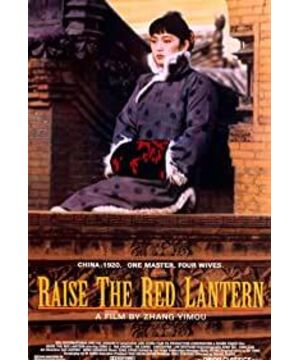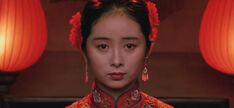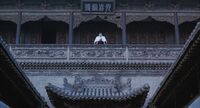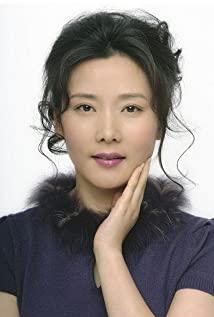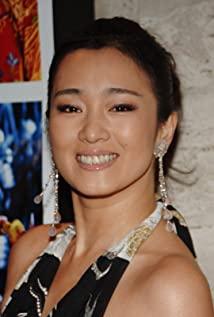According to the modern film theory of Lacan's mirror stage theory, film is a mirror in which man himself can be seen. The spectator's identification with the film is his identification with himself, with himself as a purely perceptual activity, alert and changing. Therefore, in this film, the camera as the audience is not actually peeping at a world that seems to have nothing to do with itself. On the contrary, in this world, it is the portrayal of the human spirit and soul. The Chen Family Courtyard provides a complete soil for this piece of spirit and soul, and the characters, events and fates in it are the result of concretizing these abstract things. Especially the four-bedroom wife of the Chen family compound, each character contains a symbol of human nature. The eldest wife is indifferent, the second wife is forbearance, the third wife is rebellious, and the fourth wife is contradictory. It seems that the characteristics of the first three wives are concentrated on the fourth wife—because human nature is inherently contradictory. It makes the characters of the fourth wife full and full of vitality. And that old master Chen, who has never been seen from the beginning to the end, symbolizes a mysterious power that dominates the fate of the characters. Reflected in life, it is a kind of power, such as fame, fortune, ambition, etc., all things that can satisfy human greed. And the fact that this character has never been seen seems to be a mockery: the intrigue between the characters may only be false, and in the end, it is just a void. The film uses its unique way to tell the cruel test that this kind of human nature is facing.
There is an underlying sexuality in the film. Different from the strong and intense sexual expression in "Red Sorghum", here is a subtle and repressive way. According to Freud's psychoanalysis, dreams are the imaginary satisfaction of desires. Since dreams have such a great role, when we understand literary and artistic works as dreams to some extent, the deep meaning contained in them is self-evident. There are a lot of symbolic things in the film. For example, high-hanging lanterns. From the family law of the Chen family, whichever wife Mr. Chen sleeps with, the yard of the wife will be lit with red lanterns. Here, the big red lantern is a metaphor for a strong desire. So, it is not difficult to understand why the wives are so eager for lanterns to be parked at their doorsteps, and it is not difficult to understand why the servant Yaner hangs lanterns in her bedroom (she is using this symbolic thing to satisfy their latent desires). And after the fourth wife's trick of "pretending to be pregnant" was discovered by the master, the lamp sealed with black cloth also represented a frustration of desire, and actually represented a kind of suppression of human nature. There is also an important symbolic element in the film - the thumping of the feet. The fourth wife, who received hammer feet for the first time, did not feel that it was a kind of enjoyment, because she had just stepped into this self-contained kingdom, and everything still refers to being in a passive state, including a desire to be favored or not. ; Later, she finally "experienced" the enjoyment of foot-pounding, and even actively sought alternative satisfaction - foot-pinching. And as her sexual instinct was stimulated, that mentality also changed: from being ignorant of the world to working in a scheming, from having no desires to joining the competition. In fact, here, the change in the character's attitude towards "beating the foot", the most intimate part of the human inner world, is clearly manifested in this small action.
The film seems to revolve around four women, but the four women revolve around a man. This is where feminist film theory is involved: film, as a representational narrative language, in the patriarchal social ideology, through its unique audiovisual language, grammar and rhetorical strategies, makes the visual representation of women the key to the social subject. Pornographic consumption objects. There's no Hollywood hardcore porn in this film, but the porn is latent. The director constitutes this implicit eroticism through various symbolic things. The status of women in this film can be imagined, but they are just a tool for men to vent their desires, or a machine for inheriting the lineage. They have no freedom and are not allowed to have their own thoughts in this claustrophobic compound. completely in a very weak position. And the master, who never showed up from beginning to end, gave the male audience outside the venue a space and opportunity for lust.
According to film semiotics, Metz believes that film is not speech, "not a facsimile of the perceptual whole that reality provides people with". After the film becomes a narrative, the conventions of its image composition (such as flashbacks, cross-shots, etc.) make it a language. The most typical example in the film is the switching of seasonal scenes: when looking at the Chen family compound from a bird's eye view, the screen gradually dimmed, and when it re-lit, the compound was already covered in snow. Here, we are told in a unique way of combining images: winter is coming. Different from the written word narrative, and different from the general experience of life, it is only a method used in the film. Of course, these pictures and methods may give us far more feelings than these.
View more about Raise the Red Lantern reviews


